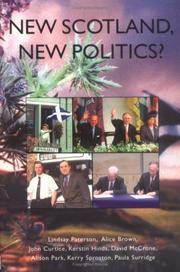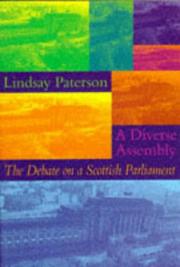| Listing 1 - 10 of 30 | << page >> |
Sort by
|

ISBN: 0585441782 9780585441788 1902930258 9781902930251 Year: 2001 Publisher: [Place of publication not identified] Polygon at Edinburgh
Abstract | Keywords | Export | Availability | Bookmark
 Loading...
Loading...Choose an application
- Reference Manager
- EndNote
- RefWorks (Direct export to RefWorks)
What are Scots' expectations of their new Parliament? What influenced them when they were casting their votes in the first elections? What social policies do they want the Parliament to pursue? How do they see the future of Scotland's relationship with the rest of the UK and the rest of Europe? And how does the country's new constitutional status relate to people's sense of national identity?The book analyses Scotland's first parliamentary election in May 1999, and looks to the future of Scottish politics, Scottish social attitudes and Scotland's relationship with the rest of the United Kingdom. Written by the leading authorities on Scottish politics and society, it provides a definitive account of social and political attitudes in Scotland at the beginning of the new parliamentary democracy, and at a time when Scotland's relationship with the rest of the United Kingdom is undergoing radical change.
Home rule --- Public opinion --- Government - Europe --- Government - Non-U.S. --- Law, Politics & Government --- Opinion, Public --- Perception, Public --- Popular opinion --- Public perception --- Public perceptions --- Judgment --- Social psychology --- Attitude (Psychology) --- Focus groups --- Reputation --- Home rule (Scotland) --- Scotland. --- Elections, 1999. --- Scotland --- Politics and government. --- Pà̀rlamaid na h-Alba --- Scots Commission in London --- Scottish Parliament

ISBN: 0748610073 Year: 1998 Publisher: Edinburgh Edinburgh University press
Abstract | Keywords | Export | Availability | Bookmark
 Loading...
Loading...Choose an application
- Reference Manager
- EndNote
- RefWorks (Direct export to RefWorks)
The 1997 Scottish Referendum confirmed the wish of the Scottish people for their first Parliament in almost 300 years. In this book Paterson draws together a collection of the key arguments for and against the reinstating of a Scottish Parliament.
Home rule (Ecosse) --- Home rule (Schotland) --- Home rule (Scotland) --- Constitutional law --- Home rule --- Scotland. --- Pà̀rlamaid na h-Alba --- Scots Commission in London --- Scottish Parliament --- Scotland. Parliament --- Scotland

ISBN: 0585110018 9780585110011 0748611576 0748610073 9780748611577 9780748610075 Year: 1998 Publisher: Edinburgh Edinburgh University Press
Abstract | Keywords | Export | Availability | Bookmark
 Loading...
Loading...Choose an application
- Reference Manager
- EndNote
- RefWorks (Direct export to RefWorks)
The 1997 Scottish Referendum confirmed the wish of the Scottish people for their first Parliament in almost 300 years. In this book Paterson draws together a collection of the key arguments for and against the reinstating of a Scottish Parliament.
Constitutional law --- Home rule --- Home rule (Scotland) --- Scotland. --- Pà̀rlamaid na h-Alba --- Scots Commission in London --- Scottish Parliament --- Scotland --- Politics and government
Book
ISBN: 1845408543 1845408551 9781845408541 9781845408558 9781845407520 1845407520 9781845407513 1845407512 Year: 2015 Publisher: Exeter, UK
Abstract | Keywords | Export | Availability | Bookmark
 Loading...
Loading...Choose an application
- Reference Manager
- EndNote
- RefWorks (Direct export to RefWorks)
Education, Humanistic --- Education --- Liberalism --- Radicalism --- Education, Liberal --- Humanistic education --- Liberal arts education --- Liberal education --- Classical education --- Liberal egalitarianism --- Liberty --- Political science --- Social sciences --- Social aspects --- Aims and objectives
Book
ISBN: 1474498442 Year: 2023 Publisher: England : Edinburgh University Press Ltd,
Abstract | Keywords | Export | Availability | Bookmark
 Loading...
Loading...Choose an application
- Reference Manager
- EndNote
- RefWorks (Direct export to RefWorks)
Examines education and social change in Scotland through analysis of a unique series of historical social surveys.
Education. --- Children --- Education, Primitive --- Education of children --- Human resource development --- Instruction --- Pedagogy --- Schooling --- Students --- Youth --- Civilization --- Learning and scholarship --- Mental discipline --- Schools --- Teaching --- Training --- Education
Book
ISBN: 1474498434 1474498418 9781474498432 Year: 2023 Publisher: Edinburgh : Edinburgh University Press,
Abstract | Keywords | Export | Availability | Bookmark
 Loading...
Loading...Choose an application
- Reference Manager
- EndNote
- RefWorks (Direct export to RefWorks)
Uses a unique series of social surveys to study education and social change in ScotlandPresents Scotland's internationally unique series of surveys of school students, from the late 1940s to the new century, with no parallel internationally in its longevity, range of topic, and depthUses Scotland as a case study as it experienced all the major educational changes of the developed world in the second half of the 20th centuryDraws comparison to domestic education reform in England and WalesDraws comparison internationally with the rest of Europe and north America, and especially with France, the Netherlands and IrelandThe social basis of these changes is systematically investigated: who benefited, who did not, did these divides narrow or widen, and what are the consequences for opportunity and civic values?The debate about Scottish independence has been transformed by this growth of education, especially among young people born since the 1960s who have been the main beneficiaries of educational expansion.Scotland developed a series of educational surveys between the late-1940s and the early-21st century that allow the country’s experience of education to be studied in systematic detail. No other country has an archive of this length and depth. The surveys include evidence on pupils’ curriculum, attainment, subjective experience of school, and destinations after leaving school, as well as details of their social characteristics and of the secondary schools which they attended. By linking also to archival evidence on the histories of schools, the book’s analysis investigates the interplay between deliberate policy and wider social change. The transformation of education in this period is accompanied by equally important economic restructuring which has led to unprecedented changes in the way that education relates to lifelong opportunity in the twenty-first century. The book investigates how these changes have underpinned Scotland’s civic values, and have contributed fundamentally to shaping the debate about the country’s constitutional future.
Education --- Educational sociology --- EDUCATION / Secondary. --- History --- Education and sociology --- Social problems in education --- Society and education --- Sociology, Educational --- Sociology --- Children --- Education, Primitive --- Education of children --- Human resource development --- Instruction --- Pedagogy --- Schooling --- Students --- Youth --- Civilization --- Learning and scholarship --- Mental discipline --- Schools --- Teaching --- Training --- Aims and objectives
Book
ISBN: 9781474471565 Year: 2022 Publisher: Edinburgh
Abstract | Keywords | Export | Availability | Bookmark
 Loading...
Loading...Choose an application
- Reference Manager
- EndNote
- RefWorks (Direct export to RefWorks)
Book
ISBN: 9781474471572 Year: 2022 Publisher: Edinburgh
Abstract | Keywords | Export | Availability | Bookmark
 Loading...
Loading...Choose an application
- Reference Manager
- EndNote
- RefWorks (Direct export to RefWorks)
Multi
ISBN: 9781474471565 9780748615902 Year: 2022 Publisher: Edinburgh Edinburgh University Press
Abstract | Keywords | Export | Availability | Bookmark
 Loading...
Loading...Choose an application
- Reference Manager
- EndNote
- RefWorks (Direct export to RefWorks)
Multi
ISBN: 9781474471572 9780748605255 Year: 2022 Publisher: Edinburgh Edinburgh University Press
Abstract | Keywords | Export | Availability | Bookmark
 Loading...
Loading...Choose an application
- Reference Manager
- EndNote
- RefWorks (Direct export to RefWorks)
| Listing 1 - 10 of 30 | << page >> |
Sort by
|

 Search
Search Feedback
Feedback About UniCat
About UniCat  Help
Help News
News